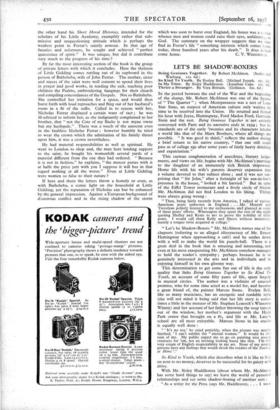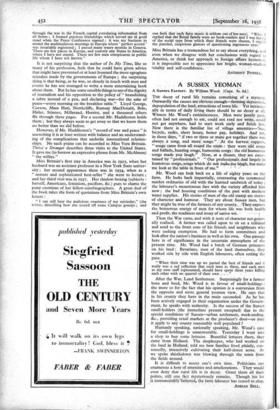LET'S BE SHADOW-BOXERS
So Kind To Youth. By Evelyn Bell. (Michael Joseph. los. 6d. In My Time. By Sisley Hudclleston. (Jonathan Cape. 125. 6d. Thrice a Stranger. By Vera Brittain. (Gollancz. los. 60.) -IN the period between the end of the War and the beginning of the slump, 'Mr. Robert McAlmon was one of the figures .of "The Quarter " ; - when Montparnasse was a sort of Lone Star State, an outpost of American culture only waiting its time to be receiired into the 'Onion. • He strutted and fretted his hour with Joyce, Hemingway, Ford Madox Ford, Gertrude • Stein. and the rest. Being Geniuses Together is notentirely 'concerned- with Paris and its narrative ends 111.1934 ; but its standards are of the early 'twenties and its characters inhabit a world like that of 'the Marx Brothers; where. all .things are possible. "It was good tb think," reflects the author during a brief return to his native country, "that one still could pass as of college age after some years of fairly heavy drinking and expatriatism."
This curious conglomeration of anecdotes, literary judge- ments', and "views on life, begins with Mx. McAlsnon's xnarriage to the 'daughter' of an immensely rich British shipowner.
Home life with his wife's parents -deserves expansion into a volume devoted to that subject alone ; and it was not sur- prising that "Sir John," after a fortnight of his sort-in-law's presence in the house, "looked a bit harried." But in spite of the Eiffel Tower 'restaurant and a lively circle of friends Mr. McAlnion did not find London to his liking. Things
were always going wrong :
"Then, being fairly recently from America, I talked of various American poets unknown in England. . . Mr. Morrell and Trevelyan politely listened to. my enthusiasms and glanced at sontz of these poets' efforts. Whereupon they spent the rest of the night quoting Shelley and Keats to me to prove the nobility of their poets. I would call them Kelly and Sheets without intention , merely a tongue twist acquired at college."
" Let's be Shadow-Boxers "Mr. McAlmon names one of his chapters (referring to an alleged idiosyncrasy of Mr. Ernest Hemingway when approaching a café) and he settles down with a will to make the world his punch-ball. There is a great deal in the book that is amusing and interesting, and even at his most exasperating Mr. McAlmon somehow manages to hold the reader's sympathy ; perhaps because he is so genuinely interested in the arts and in individuals and in enjoying himself in his own gloomy way.
This determination to get some fun out of life is the only quality that links Being Geniuses Together to So Kind To Youth, an account of some fifty years of life, spent largely in musical circles. The author was a violinist of unusual promise, who for some time acted as a model for, and became a great friend of, the .painter Marcus Stone. Evelyn Bell, like so many musicians, has an energetic and readable style (she will not mind it being said that her life story is some- times a little in the manner of Mr. Stephen Leacock's Winsome Winnie) and her account of her father throwing the soup tureen out of the window, her mother's argument with the Hyde Park orator that brought on a fit, "and life at Mr. Lane's school are all most enjoyable.. Marcus Stone in. his studio is equally well done : " It's no use,' he cried pettishly, when the picture was nearly finished, I can't exhibit the "eternal woman." It would be th= ruin of me. My public expect me to go on painting nice yowl; creatures for 'em not an inviting looking hussy like that. I'm Os= very cream of English respectability in my art. None of my yours ; persons have any feelings that would shock the readers of the Sunda:- at Horns '."
So Kind to'Youth, which also describes what it is like to live on next to no money, deserves to be successful for its gaiety an With Mr. Sisley Huddleston (about whom Mr. McAlmon has some hard things to say) we leave the world of person,' relationships and see some shadow-boxing of another sort: "As a writer for the Press (says Mr. Huddleston), . . . I went
. .
through the war in the French capital correlating information from all fronts ; I formed precious friendships which served me in good stead when the Peace Conference opened ; it was my business to attend the multitudinous meetings in Europe where perfect accord' was invariably registered ; I passed many weary months in Geneva. There are few places in Europe, and scarcely any States in America, where I have not stayed. There are few men conspicuous in public life whom I have not known."
It is not surprising that the author of In My Time, like so many of his profession, feels that he could have given advice that might have prevented or at least lessened the More egregious mistakes made by the governments of Europe ; the surprising thing is that being, as he was, so closely in touch with men and events he has not managed to write a more entertaining book about them. But he has some sensible things to say of the dignity of journalism and his opposition to the policy of" brandishing a sabre instead of a pen, and declaring war—for the sake of peace—every morning on the breakfast table." Lloyd George, Curzon, Main Hari, Northcliffe, Ramsay MacDonald, Bob, Hitler, Stinnes, Millerand, Herriot, and a thousand others flit through these pages. For a second Mr. Huddleston holds them ; but they always seem to get away so that we know them no better than we did before.
However, if Mr. Huddleston's "record of war and peace" is unexciting it is at least written with balance and an understand- ing of the complications that underlie international relation-
ships. No such praise can be accorded to Miss Vera Brittain. Thrice- a Stranger describes three visits to the United States. It gave me (to borrow an expressive phrase from Mr. McAlmon) the willies."
Miss Brittain's first stay in America was in 1925, when her husband was an assistant professor in a New York State univer- sity; her second appearance there was in 1934, when as a "mature and sophisticated best-seller" she went to lecture ; and her third visit was in 1937. Her shadow-boxing (subjects : herself, Americans, feminism, pacifism, &c.) puts to shame the puny exertions of her fellow-autobiographers. A great deal of the book takes the form of quotations from Miss Brittain's own letters : " I can still hear the malicious sweetness of my rejoinder," (she writes, describing how she scored off some Campus gossips ; and one feels that such fairy music is seldom out of her ears). "When replied that the Royal family were no book-readers and I was hardly of the social type from which their friends were chosen, I caught the puzzled, suspicious glances of questioning ingenuous eyes."
Miss Brittain has a tremendous lot to say about everything, and even when we disagree with her conclusions with regard to America, or think her approach to foreign affairs hysterical, it is impossible not to appreciate her bright, woman-student vitality and self-confidence.
ANTHONY POWELL.











































 Previous page
Previous page